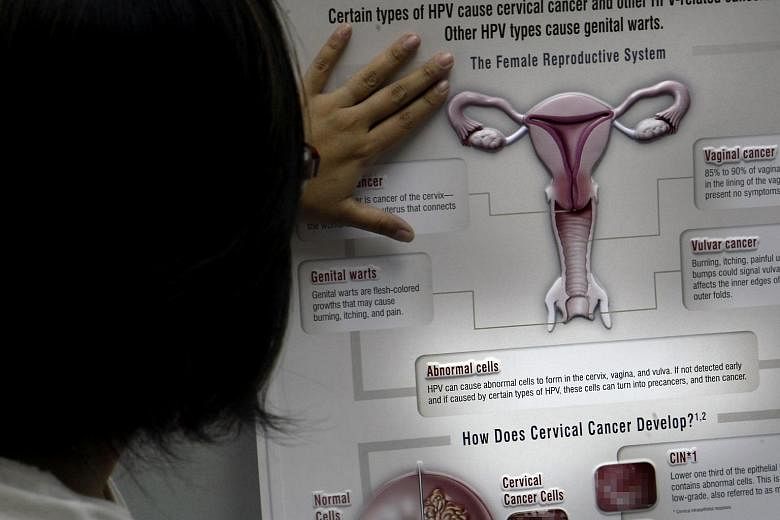A vaccine to prevent cervical cancer has been offered in Singapore for about a decade, yet many young women are unwilling to get the jab.
Awareness is low, according to a recent study but, the good news is, a 10-minute educational session can help to change their minds.
Cervical cancer is the 10th most common cancer in women here.
The two vaccines available here, Cervarix and Gardasil, protect against two major strains of human papillomavirus (HPV) that cause 70 per cent of cervical cancer.
The latest study, conducted by SingHealth Polyclinics in 2014 and published this year, surveyed 150 female students aged 15 to 19 from Hwa Chong Junior College.
Only one in four students had heard of the HPV vaccine and only six students, or 4 per cent, had already received the vaccine.
Among those who were not vaccinated, one-third said they were willing to be vaccinated, while the other students were ambivalent.
These observations echo those of a study published in June last year by the National Cancer Centre Singapore, which found that there is a poor uptake of HPV vaccination among young people as well as poor knowledge of cervical cancer and the vaccine.
Since 2010, women can use their Medisave to pay for the vaccines, but it is not clear whether this has improved the uptake of the vaccine.
Across the nine SingHealth polyclinics, the number of people getting vaccinated against HPV has inched up from 1,422 patients in 2014 to 1,536 last year. They were between nine and 26 years old.
The vaccines have been available under the National Childhood Immunisation Schedule since 2010, but they are not compulsory. A Ministry of Health spokesman said only vaccinations that protect against illnesses with serious complications and are highly transmissible are compulsory by law.
The SingHealth study showed that a 10-minute session, which features a slideshow on the basic facts about cervical cancer, HPV and how the vaccine works, may help to boost uptake rates.
After the session, the number of students willing to be vaccinated increased to more than half, and the percentage of students ambivalent towards the vaccination fell to less than half.
Dr Sarah Lim, a family physician who was involved in the study, said: "This shows a simple education session can affect their decision in getting vaccinated."
Following the study's findings, Dr Lim said she hopes there will be a structured educational programme on cervical cancer and HPV vaccination for young women incorporated into sex education programmes in schools.


